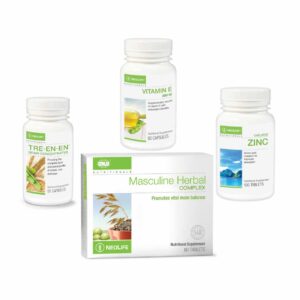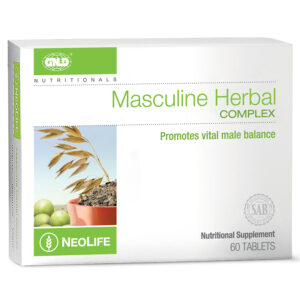GNLD NEOLIFE BUNDLE PACK PRODUCTS FOR MALE FERTILITY
Original price was: ₦78,000.00.₦60,010.00Current price is: ₦60,010.00.
+ Free ShippingAre you suffering from infertility due to Sexually transmitted diseases or other infections,Retrograde ejaculation, Genetic diseases, Hormonal problems, weak erection (erectile dysfunction), etc. ?
Look nowhere else, With GNLD (Neolife) combination bundle products, you will get back your loss ego due to infertility problem and not able to impregnate your madam.
There are GNLD supplements which are considered natural fertility supplements. Always remember GNLD supplements are not orthodox drugs but food supplements. They are produced to replenish what the body has lost through poor nutrition and also to complements your Doctor’s drugs prescription to give the utmost results.
GNLD NEOLIFE PRODUCTS FOR TREATING INFERTILITY AND LOW SPERM COUNTS IN MEN
- GNLD Tre-en-en (60 caps)
A couple wanting to improve their general well being with a natural fertility supplements should both start with upper dosages of GNLD NEOLIFE Tre-en-en whole grain supplement.
In simple terms, this natural wholegrain supplement, unique to GNLD, provides nutrition at cellular level and in doing this, prepares your body to readily absorb more dosages of other supplements you might eventually add to your program. - GNLD NEOLIFE Masculine Herbal Complex (60 tabs). Taking two tablets of this purely herbal supplement (one morning and one at night).
This natural fertility supplement for men, supports masculine vitality and healthy prostate function. Its ingredients improve physical vitality and libido. It contains 9 herbs in a beneficial, which serves as herbal medicine, balanced mix together to support normal masculine function and improve wellness and vitality. - GNLD Chelated Zinc (100 tabs)
Whilst lack of zinc might not make you infertile, it could be a key factor in making many parts of your reproductive system perform better. For women, zinc is important in helping your body utilize your reproductive hormones, oestrogen and progesterone. Low levels of zinc have been directly linked to miscarriage in the early stages of a pregnancy. Zinc might even shrink the size of fibroid tumours in women. Without zinc, a woman’s cells can not divide properly so her estrogen and progesterone levels can get out of balance which then means her reproductive system may function fully. For men, zinc is very vital in a man’s ability to get his partner pregnant. Considered one of the most important trace minerals to date for male fertility, when men with fertility deficiencies increase zinc in their diet, it has been shown to boost sperm levels; improve the form, function and quality of male sperm and thus decrease male infertility.
Low levels of zinc in the male reproductive tract can cause immature sperm, chromosomal changes and chromosomal defects in the sperm.








Reviews
There are no reviews yet.